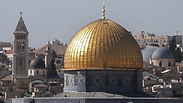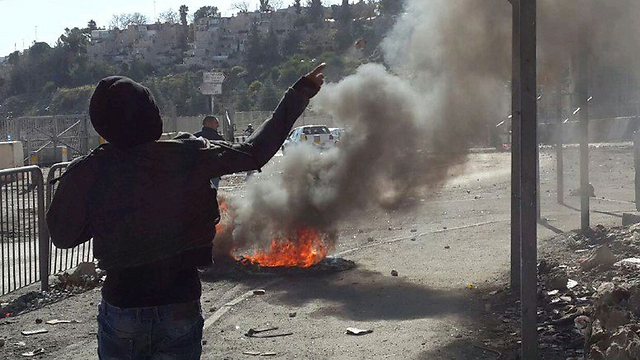
'United Jerusalem is not united, and will not be united in 47 years from now'
Photo: AFP
It's possible that one of the conclusions from the terror attacks
of the past few weeks, as difficult as it may be to digest, is that Israel's ability to control the events in Jerusalem is limited or even very limited.
So it's all nice and good that President Reuven Rivlin offers his condolences to the families which lost their loved ones in the synagogue attack, while updating us that "this is not a war between religions, between Jews and Islam," but it seems that even the president doesn’t call the shots.

Yes, even with the 10th strongest army in the world, even with the Border Guard fighters, even with the Israel Police's best special units, even with the General Security Service which might know exactly when Muhammad A. leaves his home and gets into his car in Jabaliya, but has no idea that Muhammad B. will wake up in the morning in Jabel Mukaber with the image of a sword in front of his eyes and go out to kill a few Jews in Har Nof.
Third Intifada
Ben-Dror Yemini
Op-ed: Sheikh Raed Salah welcomes all the help he can get in order to inflame the situation in Jerusalem, including Jewish provocations in the heart of Muslim neighborhoods.
There is a religious war, and 47 years after the decision to unite the city, united Jerusalem is not united, and unfortunately will not be united even in 47 years from now. Most probably, I should say.
And not because UN Security Council Resolution 748 stated that Basic Law: Jerusalem, Capital of Israel is a violation of international law, and not because most of the international community includes Jerusalem among all the other territories beyond the Green Line, but mainly because the Palestinians have made it clear, time and again, that they will not recognize the city's unification, and that any Jewish construction in the city's Arab neighborhoods stands as further proof that Israel is not interested in reaching a permanent agreement, one of the conditions of which is Jerusalem's division.
So what are we left with? A Jerusalem connected to crowded, poverty-stricken Arab neighborhoods, which are intentionally or unintentionally neglected. An active incubator of hostility and violence, which creates killing sprees fed by religious fanaticism.

Riots in Shuafat. 'An active incubator of hostility and violence, which creates killing sprees fed by religious fanaticism' (Photo: Mohammed Shinawi)
Shuafat, Beit Hanina, Jabel Mukaber, Ras al-Amud, Kafr 'Aqab, Abu Tor, Bab a-Zahara, At-Tur, Silwan, Sheikh Jarrah, Wadi al-Joz, Sur Baher and Umm Tuba, Beit Safafa and Issawiya – these are all neighborhoods which not only the people of Israel stay away from, but also the government, unless it puts on helmets and flak jackets and is armed with rubber bullets, grenade dischargers and the "Skunk" crowd-control weapon.
None of this reminds me of a united city, except perhaps for the National Insurance payments, which amount to hundreds of millions of shekels.
We can't change Palestinian President Mahmoud Abbas, we can't force him to be what he's not – a leader who makes life-changing decisions. We can't stop religious fanaticism from spreading and can't stop the Islamic State inspiration which is reflected in the weapons chosen for the terror attacks, and we also can't take in these neighborhoods and turn them into part of the organic fabric of this city. The fact is that we haven't done that for about 50 years.
So what is left? Going for the least worst choice on the list and admitting that the dream of a united city has produced bad fruit. Admitting and separating. A tall fence, people say, creates good neighborly relations.
It's true that our pullout from Gaza did not prove to be the ultimate solution, but it is probably the optimal solution under the current circumstances. Perhaps the only solution. The lesser of two evils, as the cliché goes. Any attempt to force Israeli control on the parts of the city it is unfamiliar with is a desperate attempt to dictate an impossible reality, which claims an unbearable price.
It's a one-sided move? It's not an easy move? It will create a huge security-related difficulty? Come on. As if bilateral moves have always yielded results, as if reality is simple today, as if we are not in the middle of a deep security crisis.
It's possible that for part of the Israeli people, whose opinion I do not share in this case, the withdrawal from Gaza wasn't what they wanted, but it was a solution of distress. And so is Jerusalem's division: Not a heart's desire, but a solution of distress. Now, while it's still possible.
Because tomorrow, or the day after tomorrow, or in a year, the hostility will increase, the terror attacks will become more frequent, but the city's division will no longer be possible with an Uri Ariel neighborhood in Silwan.
It's not against them. It's for our sake.















